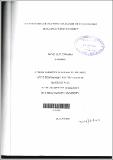An Evaluation of Churches’ and Church-Based organizations’ roles in enhancing food security in Turkana District

View/
Date
2009Author
Amach, Daniel Juma
Type
ThesisLanguage
enMetadata
Show full item recordAbstract
This study was carried out in Turkana district where people have been dependent of food handouts for many years. The district leads in the number of churches and church-based organizations working on various programs to help the community overcome food insecurity. However, food insecurity and hunger is still persistent in the district. Therefore, the study evaluated the role of these organizations in the enhancement of food security among the Turkana. The study outlines background information of Turkana and the problems its inhabitants face such as drought, chronic poverty, insecurity and marginalization which affect the community. It further discusses the responses of the church, church-based organizations and other bodies to hunger and insecurity in the district. Briefly, it presents food security updates globally, nationally, and a comparative study of regions in other countries with conditions similar to those of Turkana. The third chapter discusses methodology of data collection and analysis. Qualitative and quantitative techniques were used. Seventy-five respondents who took part in the study are classified under the following categories: churches and CBO’s representatives, focus group discussion, key informant, interview guide and beneficiaries. Chapter four presents collected and analyzed data using qualitative and quantitative techniques. Chapter five presents discussions and recommendations based on research findings. It further discusses factors that have made attainment of food security elusive such as drought, insecurity, mismanagement, and chronic poverty among others. The final chapter contains a synopsis and summary of major findings and general recommendations of the study. It also provides recommendations for further research.
Publisher
Africa Nazarene University
Description
A thesis submitted in partial fulfillment of the requirements for the degree of Master of Arts in the Department of Religion of Africa Nazarene University.
